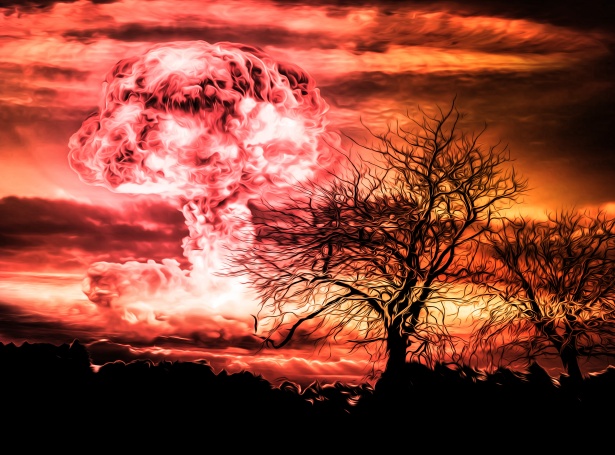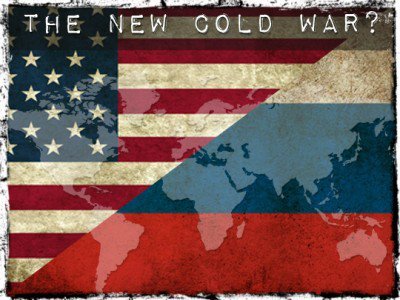
By Ray McGovern, Antiwar.com, 1/13/22
Western media are painting an image of gross failure for Russia at the U.S.-Russia bilateral talks in Geneva, as well as subsequent talks between Russia and NATO in Brussels and the Organization for Co-operation and Security in Europe (OSCE) in Vienna.
Adamant! is the impression being fostered by both Russia and the West (largely for domestic consumption): Russia will continue to oppose NATO membership for countries like Ukraine and Georgia; NATO, for its part, will continue to reject Russian opposition as “none of your business”. (Bear in mind that Ukraine and Georgia are each several years away from qualifying for NATO membership in any case.)
The corporate media takeaway is that Russian President Vladimir Putin abjectly failed to get the West to agree formally on no further expansion of NATO and that, in these circumstances, no one can divine how he might lash out (maybe invade Ukraine?). World War III, anyone?
Did Western pundits really believe that Putin expected early acquiescence to that “non-starter” proposal on NATO expansion? Far easier to make believe he did, show how he went down to defeat, and conveniently ignore signs of real progress with respect to what Moscow’s (and President Joe Biden’s) actual priorities are.
Media mention of those priorities has inched forward into subordinate clauses of lead paragraphs – usually after the word “but.” Here’s how NPR played it: “The United States and NATO rejected key Russian security demands for easing tensions over Ukraine but left open Wednesday the possibility of future talks with Moscow on arms control, missile deployments and ways to prevent military incidents between Russia and the West.”
Likewise, the Washington Post: “The United States and Russia remained deadlocked after crisis talks Monday over Moscow’s desire to block any future NATO expansion to the east, but officials agreed to continue discussions on other high-stakes security issues …”
Other High-Stakes Security Issues?
What strategic challenge does President Vladimir Putin consider most threatening? Watching this 12-minute video – especially minutes 4 to 6:30 – in which Putin tries to get through to Western reporters several years ago, will provide a good clue for Western reporters whose dogs ate their homework.
While Putin has been outspoken for 20 years on the precarious strategic situation following the Bush administration’s tearing up the ABM Treaty that had been the cornerstone of strategic balance, this video is unusually effective in showing Putin’s understandable concern and frustration.
Are dogs the standard excuse? Do Western journalists even do homework? Good question. The NY Times’ Bureau Chief in Moscow Anton Troianovsky has confessed that, after an event-packed week, he, Western officials, and Russian experts are “stumped” to explain Russian behavior. Putin, he says, is to blame for keeping people confused and “on edge”, adding that “the mystery surrounding the Russian leader’s intentions was thick as fog again this week….”. (See: Putin’s Next Move on Ukraine Is a Mystery. Just the Way He Likes It.)
It is precisely in this context that watching Putin explain Russia’s post-demise-of-the-ABM-Treaty concerns five years ago might help lazy or simply inexperienced journalists understand the importance of highly significant events over the past couple of weeks: first and foremost, President Joe Biden’s promise to Putin on Dec. 30 not to emplace offensive strike missiles in Ukraine. And, equally instructive: the importance of the U.S. negotiators’ confirming that Washington takes Moscow’s concerns seriously enough to negotiate about them – and other confidence building measures, as well.
“Progress”: The Forbidden Word
Is it unreasonable, then, to look forward to productive bilateral talks in the coming months that address what might be termed “Putin’s Pet Peeve” (although the issue is dead serious, so to speak, far more serious than the commonly understood “pet-peeve” minor annoyance)? A lot of this comes through clearly in the video, which shows Putin losing his cool watching the sleepy nonchalance on the faces of the Western journalists who are his audience: “I don’t know how to get through to you any more.”
What is important is that Putin got through to Biden on that Dec. 30 telephone call which Putin had called for with some urgency (and which was widely neglected in the Establishment media.) Hours later, the official Kremlin readout included: The presidents agreed to personally supervise these negotiating tracks, especially bilateral, with a focus on reaching results quickly. In this context, Joseph Biden emphasised that Russia and the US shared a special responsibility for ensuring stability in Europe and the whole world and that Washington had no intention of deploying offensive strike weapons in Ukraine. [Emphasis added.]
At the same time as the Kremlin readout, Putin’s main adviser on these issues, Yuri Ushakov, told reporters that Moscow was pleased with the Biden-Putin conversation on Dec. 30, adding that Biden’s pledge not to deploy offensive arms in Ukraine amounted to acknowledgment of Russia’s security concerns. Speaking to Russian media, Ushakov pointed out that this was also one of the goals Moscow hopes to achieve with its proposals for security guarantees to the US and NATO.
Ushakov, actually, is understating the case. The US non-deployment-of-offensive-missiles pledge addresses a key issue embedded in no fewer than five of the eight Articles of the Russian draft treaty on security guarantees. In contrast, only Article 4, which includes: “The United States of America shall undertake to prevent further eastward expansion of the North Atlantic Treaty Organization and deny accession to the Alliance to the States of the former Union of Soviet Socialist Republics”, addresses head-on the NATO expansion issue.
Back to the Putin Video
The 12-minute video includes subtitles in English courtesy of translator “Inessa S.” Putin was speaking to reporters attending the St. Petersburg International Economic Forum, 2016. I have taken Inessa’s subtitles and strung them together below into a full text for those who prefer to read rather than watch.
Putin to Western Reporters, June 17, 2016
Your people, in turn, do not feel a sense of the impending danger – this is what worries me.
Now, about the missile defense system, listen to me, we are all adults at this table, and experienced [professionals] at that.
But I am not even going to hope that you are going to relay everything, exactly how I said it, in your publications.
Neither will you attempt to influence your media outlets.
I just want to tell you this, on a personal level
I must remind you, though you already know this, that major global conflicts have been avoided in the past few decades, due to the geostrategic balance of power, which used to exist.
The two super-nuclear powers essentially agreed to stop producing both offensive weaponry, as well as defensive weaponry.
It is simple how it works – where one side becomes dominant in their military potential, they are more likely to want to be the first to be able to use such power.
This is the absolute linchpin to international security. The anti-missile defense system [as previously prohibited in international law], and all of the surrounding agreements that used to exist.
It’s not in my nature to scold someone – but when the United States unilaterally withdrew from the ABM Treaty of 1972 they delivered a colossal blow to the entire system of international security.
That was the first blow, when it comes to assessing the strategic balance of power in the world.
At that time [2002] I said that we will not be developing such systems also, because A) it is very expensive, and B) we aren’t yet sure how they will work [for the Americans].
We’re not going to burn our money.
We’re going to take a different option, and develop offensive weaponry, in order to retain said geo-strategic balance.
That was all.
Not to threaten someone else.
They said – “Fine, our defense system is not against you, and we assume that your weaponry is not against us.”
“Do what you like!”
As I already mentioned, this conversation took place in the early 2000s. Russia was in a very difficult state at that time.
Economic collapse, civil war and the fight against terrorism in our Caucasus region, complete destruction of our military-industrial complex …
They wouldn’t have been able to imagine that Russia could ever again be a military power.
My guess is they assumed that even that which was left over from the Soviet Union would eventually deteriorate.
So they said, “sure, do what you like!”
But we told them about the measures we were going to take in reaction. And that is what we did.
And I assure you – that today, we have had every success in that area.
I’m not going to list everything, all that matters is we have modernized our military-industrial complex.
And we continue to develop new generation warfare. I’m not even going to mention systems against the missile-defense system!
No matter what we said to our American partners [to curb the production of weaponry] they refused to cooperate with us, they rejected our offers, and continue to do their own thing.
Some things I cannot tell you right now publicly, I think that would be rude of me.
And whether or not you believe me, we offered real solutions to stop this [arms race].
They rejected everything we had to offer.
4-MINUTE MARK
So here we are today – and they’ve placed their missile defense system in Romania.
Always saying “we must protect ourselves from the Iranian nuclear threat!”
Where’s the threat?
There is no Iranian nuclear threat.
You even have an agreement with them – and the US was the instigator of this agreement, where we helped.
We supported it.
But if not for the US then this agreement would not exist – which I consider Obama’s achievement.
I agree with the agreement, because it eased tensions in the area. So President Obama can put this in his list of achievements.
So the Iranian threat does not exist.
But the missile systems are continuing to be positioned …
That means we were right when we said that they are lying to us.
Their reasons were not genuine, in reference to the “Iranian nuclear threat.”
Once again, they lied to us.
So they built this system and now they are being loaded with missiles.
You, as journalists, should know that these missiles are put into capsules
Which are utilized from sea-based, midrange Tomahawk rocket launchers
These are being loaded with “anti-missiles’ that can penetrate distances of up to 500km.
But we know that technologies advance …
We even know in which year the Americans will accomplish a new missile, which will be able to penetrate distances of up to 1000km, and then even further …
And from that moment on they will be able to directly threaten
Russia’s nuclear potential
We know year by year what’s going to happen – and they know that we know!
It’s only that you tell tall-tales to, and you spread it to, the citizens of your countries.
Your people, in turn, do not feel a sense of the impending danger – this is what worries me.
How can you not understand that the world is being pulled in an irreversible direction?
That’s the problem.
Meanwhile, they pretend that nothings going on …
I don’t know how to get through to you any more.
To read more go here.

